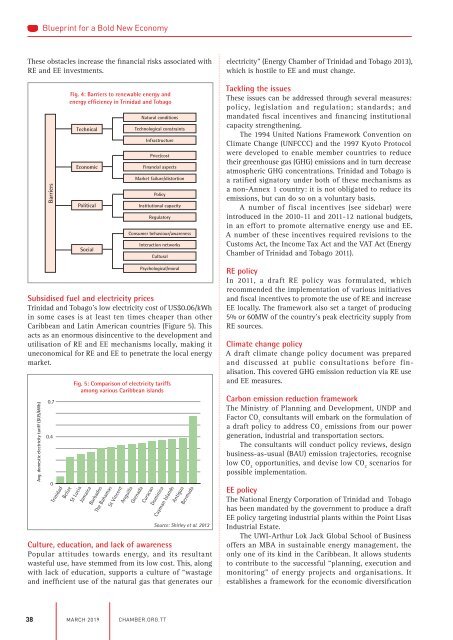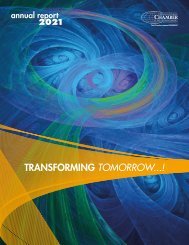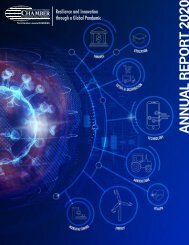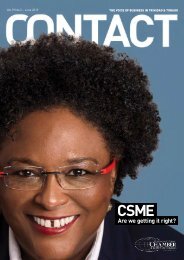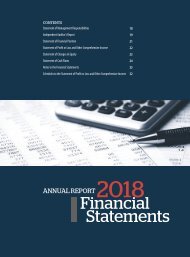Contact_Vol19No1_March2019_WEB full and final
Create successful ePaper yourself
Turn your PDF publications into a flip-book with our unique Google optimized e-Paper software.
Blueprint for a Bold New Economy<br />
These obstacles increase the financial risks associated with<br />
RE <strong>and</strong> EE investments.<br />
electricity” (Energy Chamber of Trinidad <strong>and</strong> Tobago 2013),<br />
which is hostile to EE <strong>and</strong> must change.<br />
Barriers<br />
Fig. 4: Barriers to renewable energy <strong>and</strong><br />
energy efficiency in Trinidad <strong>and</strong> Tobago<br />
Technical<br />
Economic<br />
Political<br />
Social<br />
Natural conditions<br />
Technological constraints<br />
Infrastructure<br />
Price/cost<br />
Financial aspects<br />
Market failure/distortion<br />
Policy<br />
Institutional capacity<br />
Regulatory<br />
Consumer behaviour/awareness<br />
Interaction networks<br />
Cultural<br />
Tackling the issues<br />
These issues can be addressed through several measures:<br />
policy, legislation <strong>and</strong> regulation; st<strong>and</strong>ards; <strong>and</strong><br />
m<strong>and</strong>ated fiscal incentives <strong>and</strong> financing institutional<br />
capacity strengthening.<br />
The 1994 United Nations Framework Convention on<br />
Climate Change (UNFCCC) <strong>and</strong> the 1997 Kyoto Protocol<br />
were developed to enable member countries to reduce<br />
their greenhouse gas (GHG) emissions <strong>and</strong> in turn decrease<br />
atmospheric GHG concentrations. Trinidad <strong>and</strong> Tobago is<br />
a ratified signatory under both of these mechanisms as<br />
a non-Annex 1 country: it is not obligated to reduce its<br />
emissions, but can do so on a voluntary basis.<br />
A number of fiscal incentives (see sidebar) were<br />
introduced in the 2010-11 <strong>and</strong> 2011-12 national budgets,<br />
in an effort to promote alternative energy use <strong>and</strong> EE.<br />
A number of these incentives required revisions to the<br />
Customs Act, the Income Tax Act <strong>and</strong> the VAT Act (Energy<br />
Chamber of Trinidad <strong>and</strong> Tobago 2011).<br />
Psychological/moral<br />
Subsidised fuel <strong>and</strong> electricity prices<br />
Trinidad <strong>and</strong> Tobago’s low electricity cost of US$0.06/kWh<br />
in some cases is at least ten times cheaper than other<br />
Caribbean <strong>and</strong> Latin American countries (Figure 5). This<br />
acts as an enormous disincentive to the development <strong>and</strong><br />
utilisation of RE <strong>and</strong> EE mechanisms locally, making it<br />
uneconomical for RE <strong>and</strong> EE to penetrate the local energy<br />
market.<br />
Avg. domestic electricity tariff ($US/kWh)<br />
0.7<br />
0.4<br />
Trinidad<br />
Belize<br />
St Lucia<br />
Jamaica<br />
0<br />
Fig. 5: Comparison of electricity tariffs<br />
among various Caribbean isl<strong>and</strong>s<br />
Barbados<br />
The Bahamas<br />
St Vincent<br />
Anguilla<br />
Grenada<br />
Curacao<br />
Dominica<br />
Cayman Isl<strong>and</strong>s<br />
Antigua<br />
Bermuda<br />
Source: Shirley et al. 2013<br />
Culture, education, <strong>and</strong> lack of awareness<br />
Popular attitudes towards energy, <strong>and</strong> its resultant<br />
wasteful use, have stemmed from its low cost. This, along<br />
with lack of education, supports a culture of “wastage<br />
<strong>and</strong> inefficient use of the natural gas that generates our<br />
RE policy<br />
In 2011, a draft RE policy was formulated, which<br />
recommended the implementation of various initiatives<br />
<strong>and</strong> fiscal incentives to promote the use of RE <strong>and</strong> increase<br />
EE locally. The framework also set a target of producing<br />
5% or 60MW of the country’s peak electricity supply from<br />
RE sources.<br />
Climate change policy<br />
A draft climate change policy document was prepared<br />
<strong>and</strong> discussed at public consultations before <strong>final</strong>isation.<br />
This covered GHG emission reduction via RE use<br />
<strong>and</strong> EE measures.<br />
Carbon emission reduction framework<br />
The Ministry of Planning <strong>and</strong> Development, UNDP <strong>and</strong><br />
Factor CO 2<br />
consultants will embark on the formulation of<br />
a draft policy to address CO 2<br />
emissions from our power<br />
generation, industrial <strong>and</strong> transportation sectors.<br />
The consultants will conduct policy reviews, design<br />
business-as-usual (BAU) emission trajectories, recognise<br />
low CO 2<br />
opportunities, <strong>and</strong> devise low CO 2<br />
scenarios for<br />
possible implementation.<br />
EE policy<br />
The National Energy Corporation of Trinidad <strong>and</strong> Tobago<br />
has been m<strong>and</strong>ated by the government to produce a draft<br />
EE policy targeting industrial plants within the Point Lisas<br />
Industrial Estate.<br />
The UWI-Arthur Lok Jack Global School of Business<br />
offers an MBA in sustainable energy management, the<br />
only one of its kind in the Caribbean. It allows students<br />
to contribute to the successful “planning, execution <strong>and</strong><br />
monitoring” of energy projects <strong>and</strong> organisations. It<br />
establishes a framework for the economic diversification<br />
38 MARCH 2019 CHAMBER.ORG.TT


